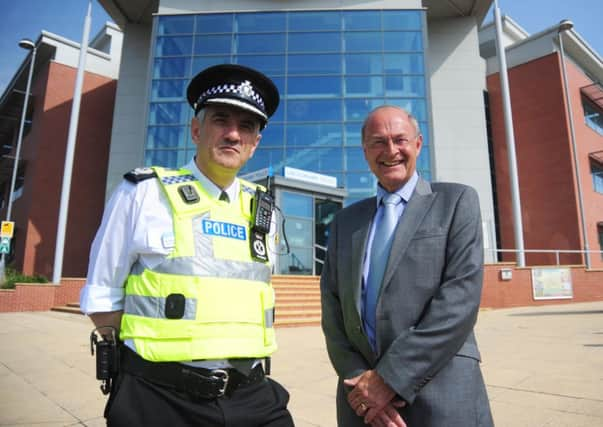Lessons to be learned from Lincolnshire Police chief suspension


Lincolnshire Police and Crime Panel has formally accepted a report produced by its Task Group, which has reviewed what lessons can be learned from the high profile case which saw Neil Rhodes suspended and then reinstated after a High Court challenge.
Since being formed in May, the Task Group has followed a thorough and detailed process, interviewing key witnesses and reviewing information from a range of sources before drawing together a series of recommendations and lessons it feels need to be learned for the future.
Advertisement
Hide AdAdvertisement
Hide AdChairman of the Police and Crime Panel, Norman Norris, said: “Police and Crime Panels have a vital role to play in both holding the Commissioner to account for his actions and supporting him in his duties. In Lincolnshire we take that role very seriously.
“I’d like to thank the members of the Task Group for their hard work over recent months in pulling together this detailed, informative and carefully written report. It is clear that lessons need to be learned from what happened in Lincolnshire and we hope the recommendations we have today endorsed are implemented in full by the organisations and individuals concerned.”
Recommendations to the Lincolnshire Police and Crime Commissioner Mr Alan Hardwick:
1) Seek expert legal advice regarding the viability of major decisions (e.g. the suspension of a Chief Constable) prior to making the decision.
Advertisement
Hide AdAdvertisement
Hide Ad2) Carry out thorough risk assessments assessing corporate, strategic, legal, financial and reputational risks (and the implications for employment law as well as Police Regulations) before making major decisions and do not focus solely on risks to the PCC.
3) Seek professional advice surrounding media and press releases when an investigation of a senior officer is to be undertaken.
Put in place better record keeping/note taking in respect of his decisions, particularly around legal decisions and documentation – by way for example of checklists and decision logs.
4) Implement local HR policies and procedures to follow and take appropriate HR advice when suspending a senior officer.
Advertisement
Hide AdAdvertisement
Hide AdImplement a Communications Strategy, prioritise internal communications and develop as required Communication Plans to deal with key events.
5) Improve communications with the Panel and establish a Memorandum of Understanding regarding the exchange of information.
Recommendations to the Chief Constable/Association of Chief Police Officers:
1) Agree a best practice procedure for notifying PCC’s when acting as a ‘CPOSA friend’.
Advertisement
Hide AdAdvertisement
Hide Ad2) Chief Officers when acting as CPOSA friends should be advised to formally record telephone conversations to save future misunderstandings.
Recommendations to the Lincolnshire Police and Crime Panel:
1) Establish a Memorandum of Understanding regarding the exchange of information with the PCC’s office.
2) Develop the already positive and professional working relationship with the PCC and his staff through training and briefings.
Recommendations to the Independent Police Complaints Commission:
Advertisement
Hide AdAdvertisement
Hide Ad1) Request that PCC’s submit conduct issues regarding Chief Constables to the IPCC in writing and that all advice to PCC’s from IPCC Commissioners is also provided in writing.
2)Assure themselves that their decision making process is robust and consistent.
Recommendations to the Home Office:
1) Create an induction course for new PCC’s with a focus on Police Regulations and employment law/human rights legislation.
2) Strengthen the Police Reform and Social Responsibility Act 2011 to give sub-groups of Panels the power to call any persons who in their view could assist Panels to give evidence and provide information, to facilitate proper scrutiny.
Advertisement
Hide AdAdvertisement
Hide Ad3) Utilise the professional expertise of HMIC and require them to be involved in the suspension review process providing the PCC, Chief Constable and Police and Crime Panel with a professional view on the suspension of a Chief Constable before and during the suspension period.